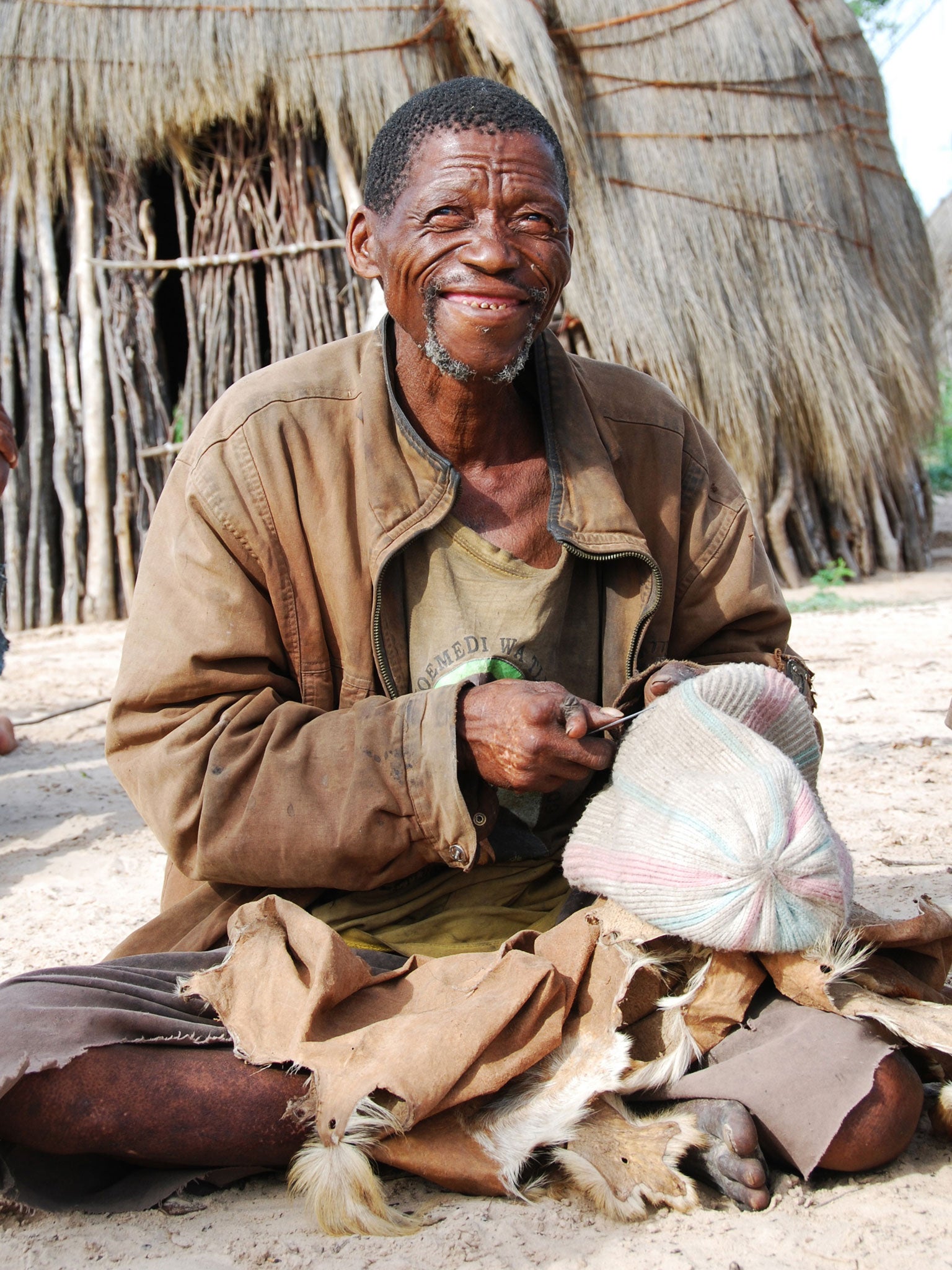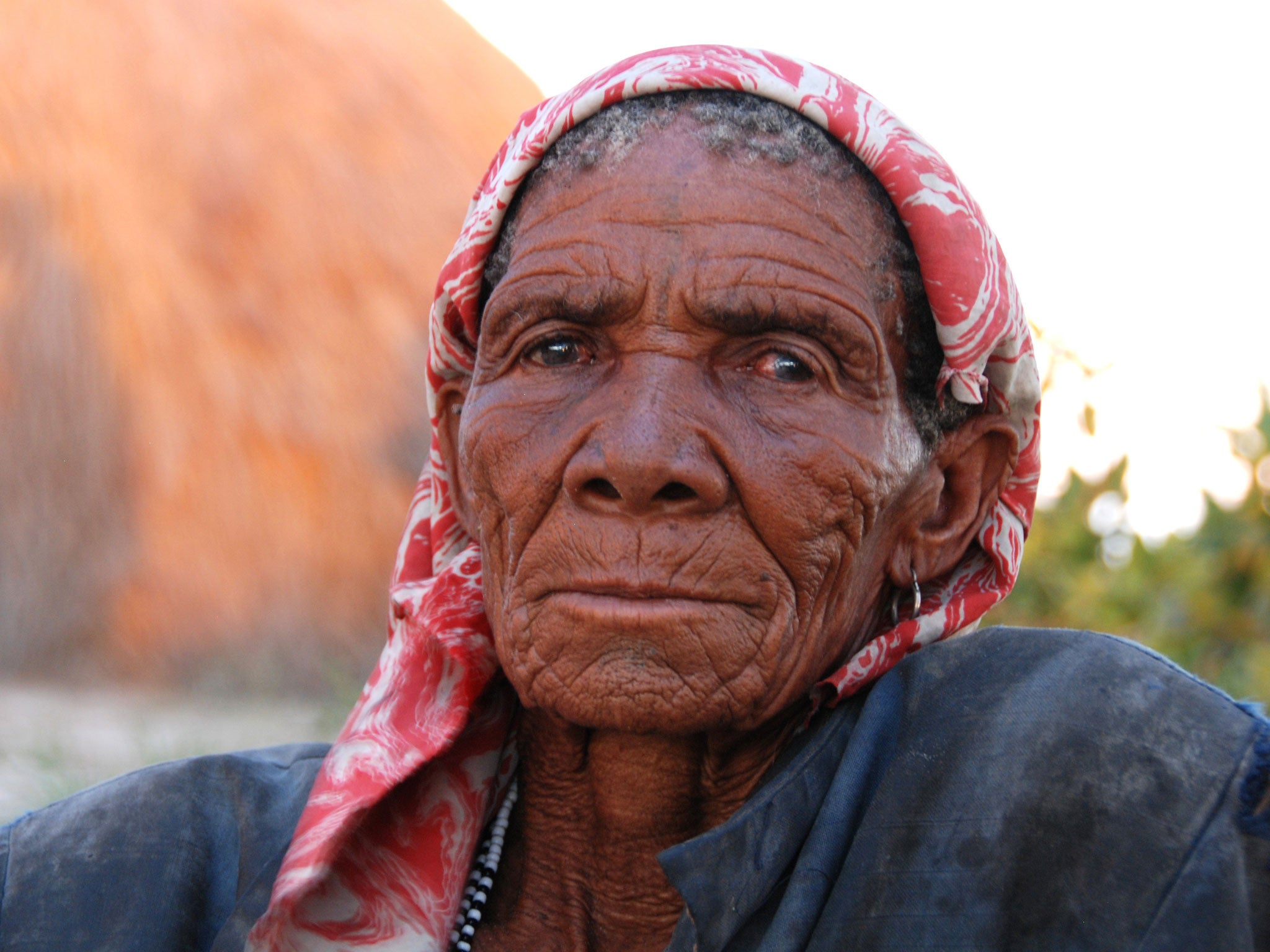Hunted by their own government – the fight to save Kalahari Bushmen
Survival International, which campaigns on behalf of tribal peoples, has called for tourists to boycott holidays in Botswana, which is forcing Kalahari Bushmen off their reserves
Your support helps us to tell the story
From reproductive rights to climate change to Big Tech, The Independent is on the ground when the story is developing. Whether it's investigating the financials of Elon Musk's pro-Trump PAC or producing our latest documentary, 'The A Word', which shines a light on the American women fighting for reproductive rights, we know how important it is to parse out the facts from the messaging.
At such a critical moment in US history, we need reporters on the ground. Your donation allows us to keep sending journalists to speak to both sides of the story.
The Independent is trusted by Americans across the entire political spectrum. And unlike many other quality news outlets, we choose not to lock Americans out of our reporting and analysis with paywalls. We believe quality journalism should be available to everyone, paid for by those who can afford it.
Your support makes all the difference.The Kalahari Plains Camp in the central Botswana desert is a great place to have a bush holiday. Many of the staff are of Bushman origin, and Wilderness Safaris which runs it offers guided walks “where guests gain life-changing insights into the unique culture of this fascinating people”.
The local Bushmen have been getting some fairly life-changing insights themselves. The Botswana government gave Wilderness Safaris permission to dig boreholes for water, which supply a pleasant swimming-pool. But the government prevents the Bushmen of the Central Kalahari Game Reserve from digging for water. It wants to drive them out, and it is using thirst as a weapon.
The Bushmen’s main borehole was concreted up by the Botswana army some years ago. I’ve seen it for myself. The pipe that should be gushing water is blocked and full of sand, and scorpions scuttle round the cracked, dry basin. It’s hard to think of a greater obscenity in a desert.
Most of the Bushmen have now been moved out of the Reserve – often forcibly, though the government denies this. They were transported to camps outside the game reserve: places like New Xade, awash with disease, prostitution and the cheapest and deadliest booze. Their character as a people is being relentlessly destroyed there. Those who are left are threatened, abused, and forced to get their drinking water from plants and trees.
Yet the Bushmen don’t lack friends. Organisations like the London-based Survival International have campaigned tirelessly for them. A British lawyer, Gordon Bennett, has devoted much time and effort to fighting their cases in the Botswana courts.
And because Botswana is a functioning democracy with an independent judiciary, he won a stunning victory in January 2011. The Court of Appeal ruled that the Bushmen could once more use the blocked-up borehole, and sink new ones. The judges described the Bushmen’s experience as “a harrowing story of human suffering and despair”.
But the government stopped it happening. And after another big legal success this summer, Mr Bennett has been barred from returning to Botswana. Without his help, the Bushmen will find it very hard to fight their cases in court again.

Why should an otherwise enlightened government treat its Bushmen like this? They should be one of the country’s chief attractions. Indeed, the official Botswana tourism agency carries a photograph of a traditional Bushman hunting party on its website – even though the government has stationed its paramilitary unit, the Special Support Group, in the Central Kalahari Game Reserve specifically to prevent the Bushmen from hunting.
The basic problem is that their traditional lands lie in the middle of the world’s richest diamond field. De Beers, anxious about its reputation, has sold out to a British outfit called Gem Diamonds. Gem Diamonds have cooperated with a South African aid agency, Vox United, to dig a water hole for the Bushmen; but the government has made it difficult to dig more, and has done nothing to provide the Bushmen with water.
Under the previous president, Festus Mogae, Botswana’s approach to the Bushmen sometimes seemed to be based on sheer prejudice; Mogae once publicly called them “primitive Stone Age creatures”. In 2008 he was replaced by a very different character, Ian Khama: younger, smoother, more aware of outside influence.
President Khama is an internationally recognised conservationist. He seems to feel that the Bushmen, who live by killing game, must be prevented from doing so. But he didn’t stop King Juan Carlos of Spain shooting elephants in Botswana last year. Perhaps he feels that a king with a gun does less harm than Bushmen hunting for food with bows and arrows.
The Bushmen are some of the world’s most ecologically attuned people. Once, on a hunting trip with a small group of Bushmen in neighbouring Namibia, I saw how careful they were about the way they killed their prey, using a minimum of arrows daubed with natural poison.
The buck I watched them kill died fast, and every bit of its carcass was used by the group. They are quick-witted people, funny, and unfailingly generous to outsiders. (“Bushmen”, incidentally, is the name most Bushmen prefer. “San”, which sounds suitably ethnic, is actually the name their Nama neighbours use for them; it means “outsiders”.)

Altogether in Southern Africa there are around 100,000 Bushmen. How many there are in Botswana itself is hard to say; they have been specifically excluded from census counts.
If they can no longer argue their case effectively in court, the Bushmen’s future seems increasingly dark. Survival International’s big card for now is to call for a tourism boycott. Previous boycotts have had some effect, mostly on public opinion in Botswana itself.
Much of the press there, which used to be hostile to anyone who drew attention to the Bushmen’s plight, has swung round. Increasingly, people ask why their government, moderate and successful in other ways, should court international disapproval over the issue.
And perhaps, as they sip their poolside gins and tonic, some tourists will ask why the Bushmen, who are such a part of Botswana’s enduring attraction, should not be allowed even water to drink.
For further information, please visit www.survivalinternational.org.
John Simpson is the BBC’s World Affairs Editor.
Join our commenting forum
Join thought-provoking conversations, follow other Independent readers and see their replies
Comments